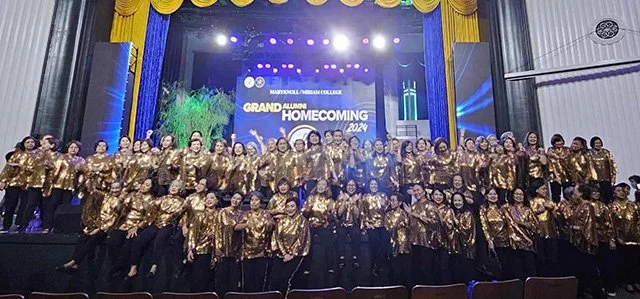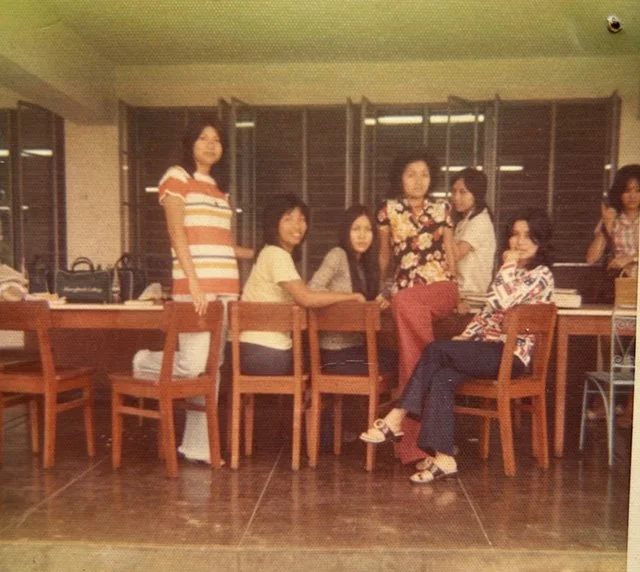Coming Home: Where Sisterhood Was Born
/MC74 demonstrates how being 70 looks like in 2024.
That caused much anxiety for me, knowing my heart was set on an all-girls’ college that produced women I admired in my early youth – Gemma Cruz (Araneta) and Lupita Aquino (Kashiwahara), for two. To which Mom, also a journalist, and cradle-to-graduation valedictorian at “Colegio de Santa Teresa,” had no objection.
As it happened, the social and political climate of the school year 1970 worked in my favor.
Civil unrest simmered as students protested with fellow citizens severely affected or strongly opposed to the policies of the administration of Ferdinand Marcos. College campuses turned into platforms for excoriating inequality, repression, and corruption, protests that often escalated to violence as government troops dispersed assemblies. This triggered my father’s alpha-male protectiveness. He turned his sights on my choice, a liberal arts institution near the school of his dreams that seemed equal if not a safer space for his then-only daughter to open her mind.
Eventually Dad relented, Mom approved, and I became a Maryknoller.
Those were four years in Philippine history marked by tumult that stole our innocence and forced my generation to grow up, confront our country’s ills, and ponder our future. In my first mass action, I hopped on a bus with dozens of schoolmates to Plaza Miranda with scores of counterparts from other colleges to march in solidarity against government abuses--all of us in our school uniforms.
Most of us had just turned 16, suddenly free from parental supervision. As our political consciousness opened, so did our appetite for experience, some more risky than others. What was college, after all, if not a time for learning, inside and outside the classroom, about ourselves, our country, and beyond.
Two years later, Marcos declared martial law toward his “New Society.” How were we supposed to respond to its mantra voiced over the airwaves by actor Vic Silayan in his authoritative baritone: “Sa ika-uunlad ng bayan, disiplina ang kailangan” (For the nation to progress, discipline is required).
Coincidentally, our school initiated Filipinization efforts completed later in 1989. Thoughts of transitioning from the Maryknoll Sisters of Ossining, New York, to lay Filipino leadership stoked patriotic fervor in the cerebral among us.
Outside school gates, we contemplated polarizing issues. Inside, we compartmentalized, because our classmates included daughters of “oligarchs,” government officials, and military brass. A favorite niece of Imelda Marcos was a groupmate. Sisterhood had been born that transcended politics.
Suddenly 1974
In a flash, graduation arrived. Off we were to start careers or families, maybe more education, further adventures. We were less surprised than impressed to hear that at least two classmates had gone “underground” to act on their profound discontent by joining organized anti-government forces. Others left the country by choice, circumstance, or accident.
Between 1970 and 1974, we discovered new friends or, in my case, my bff long before “best friends forever” was coined: newish Canadian Moy Agudo-Magsaysay, who became my maid of honor, godmother to my only child, and my go-to in joy or despair.
Classmates Tonette Tonggoy, Joy Crisostomo, Moy Agudo, author, Belle Osmena, and Menchu Genato huddle at the French Café between classes one year before graduation.
Five years ago on September 7, four from our batch received the 2019 Amazing Alumna Achiever award for outstanding service in various fields. Congratulations poured in from classmates we had hardly spoken with for 50 years, manifesting sisterhood.
MC74 batchmates received four of 11 awards as 2019 Amazing Alumni Achievers.
Last year most of us turned 70. Many are retired, some indulging passions new and not-so, yet still sharing of ourselves with those we know or don’t, out of empathy, compassion, charity, and a sense of duty.
We found we had more in common than we thought as we were nourished on the values of “truth, peace, justice and respect for the integrity of creation,” in what is now Miriam/Maryknoll College. Refreshed by our 45th reunion, we’re more connected than ever, thrilled to celebrate our shared thankfulness.
Like entrepreneur-philanthropist Rose Valdes-Garcia, who couldn’t wait for September 7, 2024 when she shook her hips at our class presentation because she loves to dance “immensely.”
Every day the Communication Arts major gives thanks for her family that taught her courage and compassion and motivated her to respond swiftly and abundantly to calls for help. Maryknoll, she says, instilled “a purpose far greater than our personal fulfillment, dreams and ambition.” Sounds like her first cousin Ninoy Aquino.
Like former Panguil, Laguna Mayor Ninay Manzana-Villanueva, who in May donated 200 saplings of narra tree to the Alviera campus in Pampanga. She also welcomed batchmates to her Hills & Berries farm showcasing her hospitality and public service, the very personification of paying success forward. The AB Economics-Social Studies major says Maryknoll boosted her self-confidence and determination to reach her goals, foremost of which was to be in a position to lift the lives of her town residents.
Like bubbly Chet Borromeo-Sharp, the Business Administration major who lives with her husband in California, where she works at an agency of the state’s Department of Consumer Affairs. “At this stage of our lives, we can’t be certain when we can reconnect with our schoolmates ever again,” she bares her motives for attending the golden jubilee, representing our North American classmates.
Like Nora Ador-Clar, who has devoted 40 years of her eventful life volunteering with a cooperative providing financial assistance to its underprivileged members. The History major has profound empathy for the beneficiaries, with whose situation she can fully relate. Now widowed and a retired school administrator-teacher, Nora is among Maryknollers who received “free education which transformed my life and widened my horizon,” and engendered “proper values and social responsibility” foremost in her mindset.
Like Business Administration major Susan de Leon-Syquia, who has “found clarity in my life's purpose.” A wife of 48 years, she is a counselor for the Center for Family Ministries, a Society of Jesus and lay ministries endeavor to “promote family wellbeing, healing and growth.” “Whether it's volunteering to help couples prepare for marriage or simply lending an ear to those in need, I am grateful for the opportunity to make a difference in the lives of others,” she proclaims a principle reinforced by her Maryknoll education. She anticipates many a “warm hug” from batchmates and “swapping stories” of the past and present.
Most of us had just turned 16, suddenly free from parental supervision. As our political consciousness opened, so did our appetite for experience, some more risky than others.
Transformative
Like Angge Pacifico, who identifies as “social worker, psychologist, counselor, trainor, peacemaker, mother, grandmother.” She has founded, directed, and consults with government and nongovernmental organizations and currently guides Binhi ng Kapayapaan and Common Ground Project, movements rooted in her quest for peace, justice, and healing. Her heart is in the Philippines and her second home is Switzerland, where she volunteers in centers for Alternative Healing Therapies for Filipinas and Refugees.
Fifty years after graduation, grateful members of Maryknoll College Class of 1974 from around the world return to their alma mater Sept. 7 (clockwise): Chet Borromeo-Sharp, Rose Valdes-Garcia, Susan de Leon-Syquia, Angge Pacifico, Ninay Manzana-Villanueva and Nora Ador-Clar.
Angge’s children share her memories of the Katipunan Road campus because their mother brought them along when she taught Social Work after earning the degree. The children hung out at the Day Care center where Angge nursed them between classes. As toddlers they witnessed her in action as coordinator of the institution-wide participation in the first People Power uprising. “Maryknoll’s mission of ‘forming catalysts for social transformation’ has been my guiding post in how I raise my family now including my grandchildren and in all my endeavors,” she declares.
And most certainly like the 17 members of the core group behind this gathering: Mawie Yan-Aglipay, Susan de Leon-Syquia, Maria Fallarme-Ronson, Annie Luna-Trias, Nena Villavicencio, Marilyn Aberilla-Mayoralgo, Lynda Reyes-Geraldez, Odette Ong, Emily Siy, Caling Tanco-Young, Ninay Manzana-Villanueva, Michelle Ileto-de Belen, Millie Sta. Maria- Thomeczeck, Bong Agcaoili-Garrovillo, Edy Montecastro-Lim, and class president Menchu Genato-Henson, all model “Knollers” in word and deed, who have dedicated time and resources to ensure this 2024 reunion is one for the ages.
Menchu’s request for me to pen our story for the golden homecoming issue of MC Times was a gift. She and I belonged to a mixed-batch group that converged on the campus French Cafe, our refuge from academic or personal challenges. My opposite, she was the class beauty, “the one-most-likely,” every teacher’s favorite. I, in contrast, was the renegade, did homework on auto-pilot, ditched the green-and-white for Faded Glory blues. Somehow we clicked, each of us in our diverse bevy that knew how to have fun then hit the books when it mattered.
Minutes after my Viber chat with Menchu ended, my essay began to write itself, as faces and moments resurfaced from half a century ago and brought me to this day:
One word comes to mind at this most meaningful occasion;
For living longer, where we’ve said goodbye to many;
For the friends we’ve made with whom we’ve grown and learned, laughed and wept, stumbled and risen;
For the joy of wisdom and grace from having hurt and been hurt, atoned and forgiven, received and returned kindness in ways never too small;
For the gift of waking up to a new morning knowing we are loved and appreciated;
For innumerable memories that bond us, to cherish, so precious, like gold.
It’s Gratitude.
MC’74 core member Cherie M. Querol Moreno, Communication Arts, is a journalist-community leader based in the San Francisco Bay Area and a recipient of the 2019 Triple A (Alumni Achiever Award).
More articles from Cherie Querol Moreno







